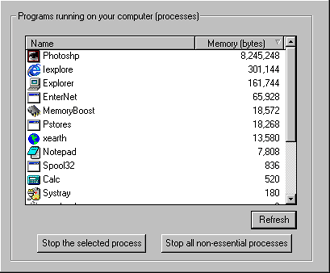|
Sections
 The programs list The programs list
 Closing programs Closing programs
Related articles
 The Manager The Manager
 Programs Programs
Quick links
 Table of Contents Table of Contents
 Questions Questions
|
|
Detective window

The programs list
The list in this window shows all the programs currently running on your computer,
along with how much memory they consume. You can use the Refresh button to update the
list if you like as programs open and close, or grow and shrink.
The detective window can be useful in helping you to understand which programs really
tax your computer's ability. You could use the information here, for example, to decide
not to run too very large programs at the same time. This will help keep your memory
high and your computer more stable. Or, more importantly (and more easily), you can
use this information to have MemoryBoost keep your programs well memory-fed.
MemoryBoost can free a certain amount of memory for any of your programs right before
they start, to ensure they run smoothly and at full-speed. You can do this by creating
special shortcuts for your program in the Programs window.
Finally, you may wish to read the special article on memory
in the Detective. It explains in greater detail what the memory numbers mean,
and from whence they come.
Closing programs
Sometimes one of your programs may get stuck, become unstable, or otherwise become
unreliable. In this situation, you may want to stop the program before it hurts your
other programs or causes your computer to become unstable. The "Stop the selected process"
button lets you do this. When you click it, it will stop whichever program you have
selected in the list, even if this program is frozen or otherwise broken.
You should, however, be careful when using this option. If you stop a system process,
your computer may restart. And if you stop a program before you saved your work,
you may lose your unsaved work in that program. Generally speaking, this option should
be used only for frozen programs, ones you cannot shut down normally.
If, on the other hand, you wish to shut down a lot of programs at once, you can use
the "Stop all non-essential processes" button. This is sometimes useful when installing
new programs, because the installer will ask you to exit all running programs. This is
also useful when your computer's memory is very low and you need to quickly exit everything
to free things up. MemoryBoost makes sure it only closes user processes (not system
processes) so your computer should not reboot.
|

